The worlds most trusted pediatrics resource continues to provide the most authoritative coverage of the best approaches to care in this streamlined new edition. With two new editors, extensive updates, and expanded online features, youll have the well-rounded, up-to-date guidance you need to offer your patients the very best. ? Stay current on recent developments and hot topics such as melamine poisoning, long-term mechanical ventilation in the acutely ill child, sexual identity and adolescent homosexuality, age-specific behavior disturbances, and psychosis associated with epilepsy. ? Tap into substantially enhanced content with world-leading clinical and research expertise from two new editors Joseph W. St. Geme III, MD, and Nina F. Schor, MD, PhD who contribute on key subspecialties, including pediatric infectious disease and pediatric neurology. ? Manage the transition to adult healthcare for children with chronic diseases through discussions of the overall health needs of patients with congenital heart defects, diabetes, and cystic fibrosis. ? Recognize, diagnose, and manage genetic conditions more effectively using an expanded section that covers these diseases, disorders, and syndromes extensively.
Nelson Textbook of Pediatrics_vol 1
KShs 12,000.00
The worlds most trusted pediatrics resource continues to provide the most authoritative coverage of the best approaches to care in this streamlined new edition. With two new editors, extensive updates, and expanded online features, youll have the well-rounded, up-to-date guidance you need to offer your patients the very best. ? Stay current on recent developments and hot topics such as melamine poisoning, long-term mechanical ventilation in the acutely ill child, sexual identity and adolescent homosexuality, age-specific behavior disturbances, and psychosis associated with epilepsy. ? Tap into substantially enhanced content with world-leading clinical and research expertise from two new editors Joseph W. St. Geme III, MD, and Nina F. Schor, MD, PhD who contribute on key subspecialties, including pediatric infectious disease and pediatric neurology. ? Manage the transition to adult healthcare for children with chronic diseases through discussions of the overall health needs of patients with congenital heart defects, diabetes, and cystic fibrosis. ? Recognize, diagnose, and manage genetic conditions more effectively using an expanded section that covers these diseases, disorders, and syndromes extensively.
2 in stock
| SKU: | 9788131232774 |
|---|---|
| Categories: | Medical Books, Paediatrics |
Related products
-
Workbook and Lab Manual for Sonography, 5th Edition
KShs 15,832.00Workbook for Sonography: Introduction to Normal Structure and Function, 5th Edition. This well-constructed review tool supports and completes the main text by providing an excellent introduction to sonography while preparing users to accurately identify sonographic pathology and abnormalities. Each workbook chapter opens with review questions on material from the corresponding chapter in the main text. Review questions are followed by drawings from the text — with parallel sonograms where appropriate — that include leader lines to label structures, but not the labels themselves. Workbook users will fill in the labels to identify structures in the drawings and sonograms, reinforcing visual and auditory learning from the text. Answers can be looked up in both the workbook appendix and by comparing the workbook figures to the labeled figures in the main text.
-
An Introduction to Forensic Genetics, 2nd Edition
KShs 16,198.00This is a completely revised edition of a comprehensive and popular introduction to the fast moving area of Forensic Genetics. The text begins with key concepts needed to fully appreciate the subject and moves on to examine the latest developments in the field. Now illustrated in full colour throughout, this accessible textbook includes numerous references to relevant casework. With information on the full process of DNA evidence from collection at the scene of a crime to presentation in a legal context this book provides a complete overview of the field.
Key Features:
- Greater in-depth coverage of kinship problems now covered in two separate chapters: one dealing with relationships between living individuals and the other covering identification of human remains.
- New chapter on non-human forensic genetics, including identification of bacteria and viruses, animals and plants.
-
Robbins & Cotran Pathologic Basis of Disease
KShs 18,480.00Readable and highly illustrated, Robbins and Cotran Pathologic Basis of Disease, 10th Edition presents an in-depth, state-of-the-art overview of human diseases and their cellular and molecular basis. This best-selling text delivers the latest, most essential pathology knowledge in a readable, interesting manner, ensuring optimal understanding of the latest basic science and clinical content. More than 1,000 high-quality photographs and full-color illustrations highlight new information in molecular biology, disease classifications, new drugs and drug therapies, and much more. This superb learning package also includes an enhanced eBook with a full complement of ancillary content on Student Consult.
-
Myles Textbook for Midwives, International Edition, 17th Edition
KShs 5,642.00Written by midwives for midwives, Myles Textbook for Midwives has been the seminal textbook of midwifery for over 60 years. It offers comprehensive coverage of topics fundamental to 21st midwifery practice. Co-edited for the second time, by internationally renowned midwife educationalists, Professor Jayne E Marshall and Maureen D Raynor from the United Kingdom with a team of contributors from across the midwifery community it retains its clear, accessible writing style. Most chapters provide useful case studies, websites of key organisations and charities for individuals to access further information. Reflective questions at the end of each chapter as well as annotated further reading aid reflective learning and stimulate discussions relating to continuing professional development.
Key Features-
- The book covers key frameworks that govern midwifery practice, exploring ethical and legal frameworks that are essential to every accountable, autonomous, professional midwife.
-
- Includes employer-led models of supervision, vital elements of leadership and clinical governance that supports the provision of high quality maternity services and standards of midwifery practice.
-
- The concept of resilience is introduced for the reader to contemplate their personal contribution in creating an environment that is conducive to protecting the wellbeing of themselves and colleagues within the workplace.
-
- The text covers the UN 2030 Agenda for Sustainable Development, highlighting the importance of midwives as global citizens with common goals, and together they form a strong global community prepared to challenge social inequalities and take action to help end extreme poverty.
-
- Covers designing and implementing high quality midwifery care using evidence, policy and models of care. Highlights why a holistic and evidence-informed approach is necessary to achieve effective care for all. Working examples will help the reader to think critically about their own practice.
-
- For this edition several new chapters are introduced covering concealed pregnancy, fear of childbirth (tocophobia), care of the acutely unwell woman and end of life issues including rights of the fetus/neonate and ethical considerations.
Author InformationEdited by Jayne E. Marshall, FRCM, PFHEA, PhD, MA, PGCEA, ADM, RM, RN, Foundation Professor of Midwifery and NMC Lead Midwife for Education, School of Allied Health Professions, College of Life Sciences, George Davies Centre, University of Leicester, UK and Maureen D. Raynor, MA PGCEA ADM RMN RN RM, Senior Lecturer (Midwifery), De Montfort University, Faculty of Health and Life Sciences, School of Nursing and Midwifery, Leicester, UK -
-
Pocket book of hospital care for children
KShs 3,640.00This is the second edition of the Pocket book of hospital care for children. It is for use by doctors, nurses and other health workers who are responsible for the care of young children at the first level referral hospitals. The Pocket Book is one of a series of documents and tools that support the Integrated Management of Childhood Illness (IMCI). It is an update of the 2005 edition, and presents up-to-date evidence based clinical guidelines from several recently updated and published WHO guidelines and recommendations. The guidelines are for use in both inpatient and outpatient care in hospitals with basic laboratory facilities and essential medicines. These guidelines focus on the management of the major causes of childhood mortality in most developing countries, such as newborn problems, pneumonia, diarrhoea, malaria, meningitis, septicaemia, measles and related conditions, severe acute malnutrition and paediatric HIV/AIDS. It also covers common procedures, patient monitoring and supportive care on the wards and some common surgical conditions that can be managed in small hospitals.
Details of the evidence on which the Pocket Book is based can be found on the WHO website from the relevant published guidelines provided in the bibliography. This bedside paediatric care guidelines are applicable in most areas of the world and may be adapted to suit country specific circumstances. However, advanced and high care treatment options, such as intensive care or mechanical ventilation, are not described. The Pocket Book is also available in hard copies although the online version will be updated regularly as new evidence emerges.
-
Nursing Foundation: Concepts and Perspectives
KShs 6,580.00The book under title ‘Nursing Foundation: Concepts and Perspectives’ has been written in lucid style, simple language and with goal-oriented outlook. It will help the students of undergraduate nursing programme at the post basic level which is a broad based education within an academic framework, to develop understanding of philosophy, objectives, responsibilities of nursing profession; to build upon the skills and competence acquired at the diploma level. It will orient them to the current concepts involved in practice of nursing and developments in nursing profession; direct to upgrade their critical thinking skills, competencies and standards required for practice of professional nursing and to follow nursing process. This book provides up-to-date information in accordance with the latest syllabus prescribed to them and they will be able to identify professional, ethical, and legal aspects of nursing profession, current trends in health and nursing and steps of nursing process. Each chapter deals with a specific aspect of foundation of nursing with complete clarity of expression, simplicity to exposition, intensive text and adequate illustrative material in the form of diagrams, flow charts and tables followed by key points, chapter end questions comprising of essay type questions, short answer questions and multiple choice questions at the end of each chapter. The chapters have been sequenced to facilitate ease and continuity in reading and understanding, and at the end of each chapter, related references have been given as suggested reading.
-
Hutchison’s Clinical Methods International Edition, 25th Edition
KShs 6,370.00Hutchison’s Clinical Methods, 25th International Edition, offers comprehensive guidance on patient assessment, clinical examination, and diagnostic skills, essential for medical students and practitioners worldwide.
Sir Robert Hutchison first published his textbook on Clinical Methods in 1897 and this latest edition maintains its reputation as the go-to guide to learn the core skills every clinician needs in their everyday practice.
Medical students and doctors in training will find essential guidance to taking a full history, examining a patient and interpreting the findings. They will learn the art of understanding, contextualising, communicating and explaining, with the doctor-patient relationship firmly at the centre of their practice. These skills remain essential for every doctor, in addition to modern investigative methods.
The book covers basic principles, different patient groups and all the main body systems. Each chapter includes relevant clinical methods and offers guidance for appropriate investigations. New methods and investigations are incorporated into established patterns of clinical practice to offer a fully integrated approach.
This award-winning textbook remains as relevant today as ever and will be treasured by doctors at all levels of training and practice as an outstanding source of learning and reference.
Key Features-
- All chapters carefully reviewed and updated to reflect modern practice
-
- Written by experts in their field and reviewed by an International Advisory Board – content is relevant to a wide international readership including in the Indian sub-continent, the Middle East and Africa
-
- Covers all the main body systems, including the core areas of respiratory, cardiological, gastrointestinal, neurological and locomotor systems
-
- Text organised by system and problem to aid navigation
-
- Chapters can be read individually, to avoid duplication and need for cross-referencing
-
- Tabulated information and diagrams for clarity and conciseness
-
- Tailored to student needs but suitable for doctors at all levels of training and practice
-
- Winner of multiple awards, including the BMA book awards
-
- New appendix describing the clinical features of COVID-19
Author InformationEdited by Michael Glynn, MA, MD, FRCP, FHEA, Consultant Physician, Gastroenterologist and Hepatologist, Barts Health NHS Trust; Honorary Senior Lecturer, Barts and the London School of Medicine and Dentistry; Former National Clinical Director for GI and Liver Diseases, NHS England and William M Drake, DM FRCP, Consultant Physician/Reader in Medicine, Department of Endocrinology, St Bartholomew’s Hospital, London, UK -
-
Mims’ Medical Microbiology and Immunology, International Edition, 7th Edition
KShs 5,642.00MIMS’ Medical Microbiology and Immunology is loved internationally for its thorough yet easy-to-follow coverage of microbiology, infectious diseases, and immunology as a dynamic interplay between microbes and host. Covering the fundamentals of these closely linked disciplines, MIMS’ takes a systems approach to elaborate on epidemiology, clinical presentation, pathogenesis, and diagnostic approaches, as well as treatment and infection control considerations, supplemented by case-based examples. Complex scientific and clinical concepts are explained clearly and simply with the help of illustrations and a range of accompanying online content. Students will come away with a deep understanding of topics and processes, and will return to this book for reference time and again.Key Features- Clear writing and easy-to-understand explanations – perfect for students learning to grasp the fundamentals of both microbiology and immunology
- User-friendly format with colour coding, key concept boxes, and dynamic illustrations for easy navigation
- Organised by body system – goes beyond the ‘bug parade’ to help you understand clinical context
Author InformationBy Richard Goering, BA MSc PhD, Professor and Chair, Department of Medical Microbiology and Immunology, Creighton University School of Medicine, Omaha, Nebraska.; Hazel M. Dockrell, BA (Mod) PhD, Professor of Immunology, Faculty of Infectious and Tropical Diseases, London School of Hygiene and Tropical Medicine, London, UK; Mark Zuckerman, BSc(Hons), MBBS, MRCP, MSc, FRCPath, Consultant Virologist and Honorary Senior Lecturer, South London Specialist Virology Centre, King’s College Hospital NHS Foundation Trust, King’s College London School of Medicine, London, UK; Peter L. Chiodini, BSc, MBBS, PhD, FRCP, FRCPath, FFTM, RCPS(Glas), Consultant Parasitologist, Hospital for Tropical Diseases, London and Honorary Professor, London School of Hygiene and Tropical Medicine, London, UK

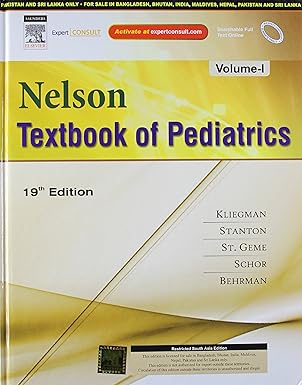
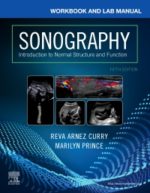

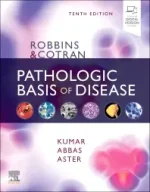

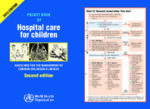
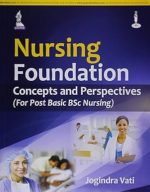
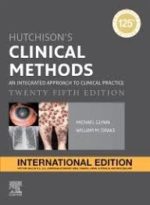
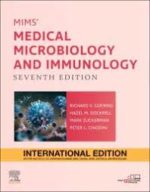
Be the first to review “Nelson Textbook of Pediatrics_vol 1”